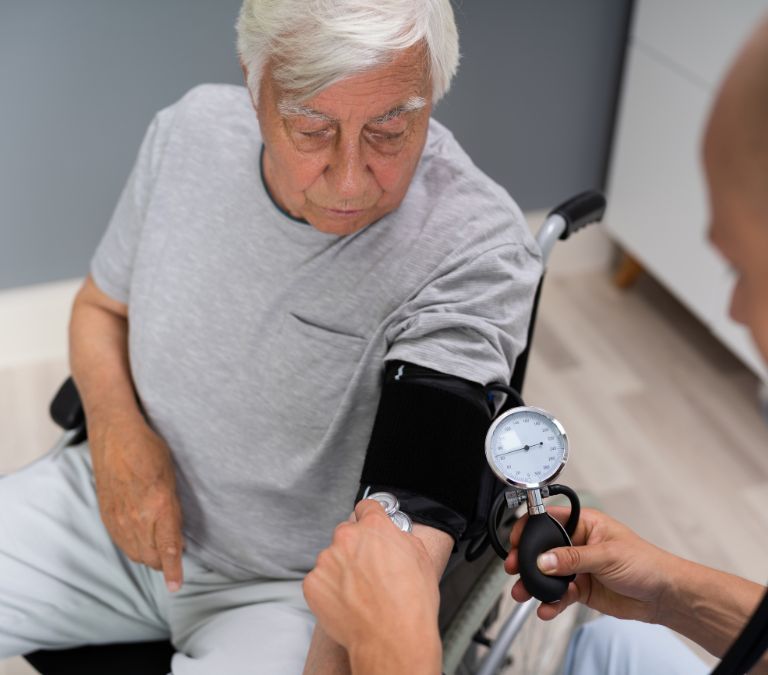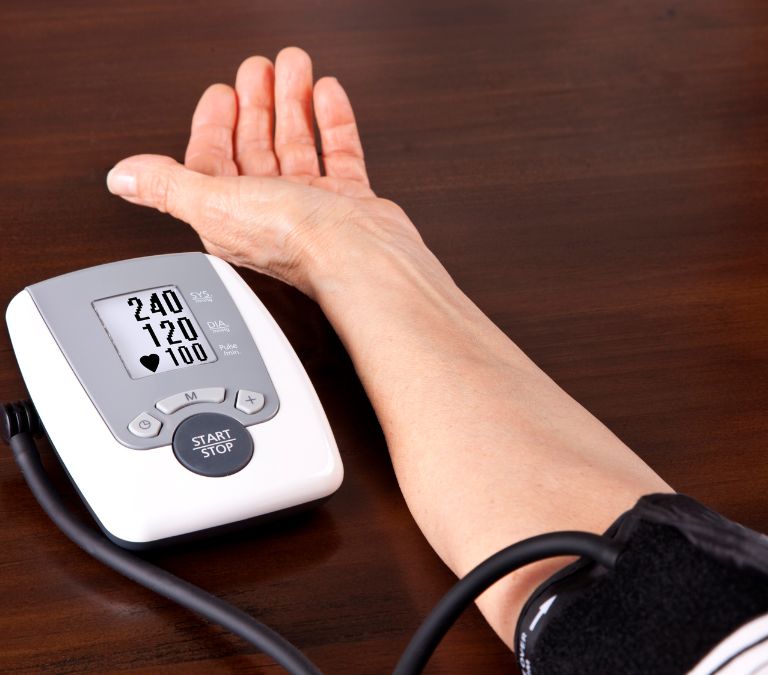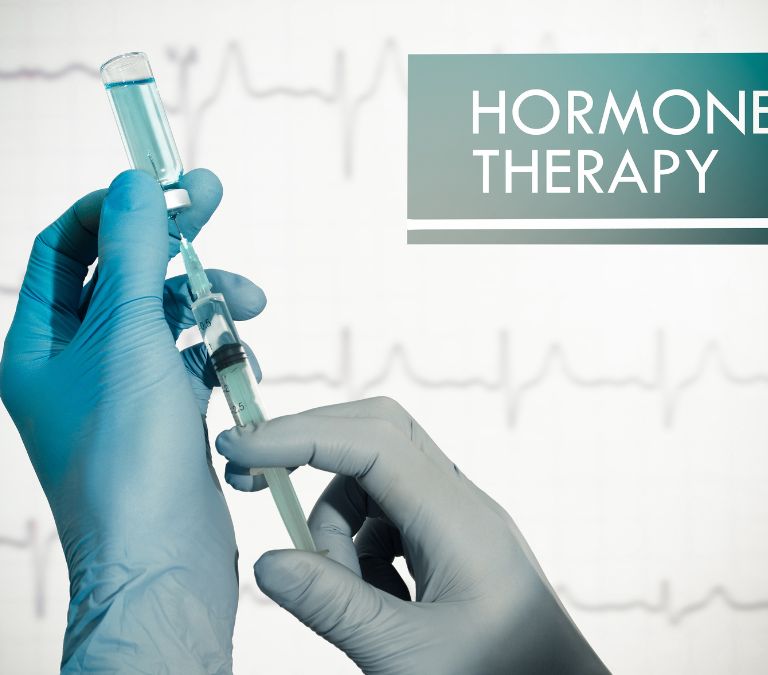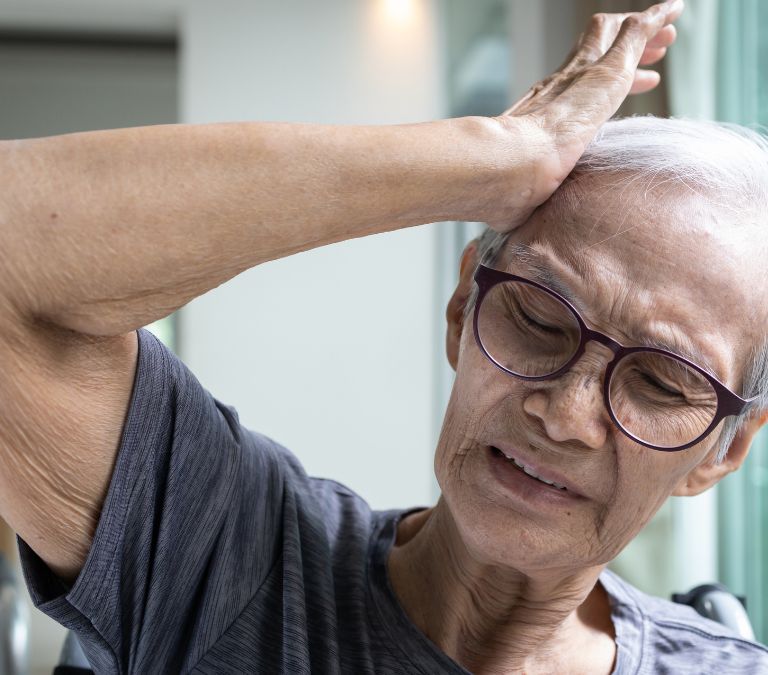Many of us have heard of “high blood pressure.” Some of us even had to check our blood pressure this morning. And most of the time, it makes us uncomfortable to see those figures spike beyond the normal range.
Human blood flows through the blood vessels within a certain pressure range to enable efficient perfusion. This mechanism means that the blood flow must be within a certain pressure range to maintain normal body function.
Sometimes, blood flow exceeds the normal range, affecting an individual’s body functions. Also called hypertension, high blood pressure is common among menopausal women.
This high pressure is accumulated by the blood on the walls of the arteries leading to various symptoms and health conditions, like a cardiac failure and other heart-related issues. The quantity of blood pumped by your heart and the elastic resistance of your arteries are some factors your blood pressure depends on.
As women grow older, approaching menopause, their body becomes less strong and resistant than they used to be; hence the odds of them getting high blood pressure increases. Usually, blood pressures are measured in millimeters of Mercury (mmHg) with its systolic and diastolic values.
Also, It is said that blood pressure increases as the heart pumps more blood, narrowing the arteries in the process. Although having an abnormal blood pressure range is not ideal, high blood pressure is not a death sentence. Sometimes it would be nothing serious and still is mostly asymptomatic.
It is possible to carry high blood pressure for years without any symptoms, so it is advised to monitor your blood pressure regularly. This checkup is important because, even when the high blood pressure does not show symptoms, it might still indicate a serious medical condition.
It is dangerous to leave high blood pressure untreated, and for our ladies in menopause, it is advised to always monitor yourself and study to be ready. It is not a death sentence for high blood pressure; it is controllable. All you need to do is meet the right health professional.
The whole concept of blood pressure is as understandable as it is dynamic. It depends mostly on the heart, though. When the heart pumps blood, the organs are perfused, and the strength of perfusion from the heart is reflected in the blood pressure.
Hence, a defect in the heart affects the blood pressure, and the blood pressure affects the heart too because the heart is a muscle that pumps blood around the body.
High Blood Pressure In Menopausal Women

According to a recent study, it has been deduced that high blood pressure is often overlooked in menopausal women. This overlook happens because women are more prone to stress at that age.
Also, the physician might unintentionally pay lesser attention to detail. This oversight has increased the risk of other infections like stroke and cardiac failure. Sometimes, it is the women themselves that overlook their shooting pressure.
This popular ideology that a woman’s spiking pressure is due to anxiety, stress, and other temporary conditions might trick some women into thinking their high-pressure symptom is normal. It happens most times because stress and anxiety elevate the blood pressure abnormally but cannot be classified as high blood pressure because it is temporal.
Knowing the difference is key, and there’s no better way to be sure than seeing a physician. Seeing more than one physician is necessary.
A recent study estimated the percentage of menopausal women with hypertension to be a whopping 80%. So, this data means that 8 in every 10 women aged 45 and above have high blood pressure. That makes this topic more universal and one that every middle-aged woman should pay attention to.
In women, hypertension is mostly associated with middle-aged menopausal women, which is why it is sometimes masked. It is more difficult to tell the difference because there is usually no distinctive hypertension symptom that can be used to differentiate hypertension from normal menopausal anxiety spikes.
How is high blood pressure linked to menopause?

A major indication of a woman going through menopause is hypertension. It is because a woman’s body undergoes many changes as she ages. Also, the many hormonal declines associated with menopause lead to reactions that can trigger blood pressure.
The main menopause-hypertension link is still a mystery. However, scientists have discovered that the hormone “estrogen” controls blood pressure by preventing plaque accumulation in the walls of arteries while also preventing arteries from narrowing. It helps to prevent any resistance to blood flow which would automatically increase the blood pressure.
That is why menopausal women with reduced estrogen levels are more prone to hypertension and other heart infections that might arise from high blood pressure. The cause of high blood pressure during menopause is enormous as it can be linked to many symptoms associated with menopause. Be extra cautious with your blood pressure when you’re of menopausal age and beyond.
Causes Of High Blood Pressure In Menopausal Women
Menopause is a much-anticipated age in a woman’s life, and it has its perks. As much as it comes with a relief of menstrual cramps, the changes it brings to your body and health might be a handful to handle.
But, you need not worry; there are various ways around it. By knowing the symptoms and their causes, you would not just be able to control it but prevent it as well.
As regards hypertension in menopause, various factors make it more prevalent in older women. These factors or “causes” are mostly in tandem with the symptoms and changes associated with menopause. Below are some of the causes of menopause in menopausal women.
- A decline in estrogen levels:
During menopause, the major change and adjustment is the decline in the release and production of hormones like estrogen and progesterone. Estrogen, which helps easy blood flow by dilating blood vessels, is reduced in a woman’s system during menopause.
As such, the blood flow is somewhat occluded, and for perfusion to occur efficiently, the heart is stressed to pump with more strength releasing a higher pressure which leads to hypertension and the symptoms that follow. Hence, the decrease in estrogen level can cause women’s hypertension during menopause.
Solution: Hormone Replacement Therapy (HRT)

For very severe cases of hypertension, this method is effective. Suppose the physician has effectively linked hypertension to a decrease in estrogen level. In that case, it is advisable to do a Hormone replacement therapy ( HRT), a medical procedure where you medically replace the body’s estrogen level. This procedure is like a menopausal reversal but very effective.
- Nutrition:
The benefits of a healthy diet can be overemphasized. Not just because of hypertension, a person should normally eat healthy because of the many advantages. As a woman ages, the diet should be greatly monitored because if not controlled properly, you might just be consuming your way to hypertension.
Diets that contain too much salt, or fat, tend to increase blood pressure enormously. This dieting issue has been the case for many stubborn or ignorant women during menopause. They consume a lot of improper stuff and begin to complain later.
Solution: Always eat a healthy diet
To some people, the definition of a healthy diet is relative, yet, there are certain foods we should avoid because they are unhealthy, and their risks outweigh their nutritional values. Moderating the number of certain nutrients is also important, so even if we eat certain foods, we should know the quantity that is healthy for us.
On this note, getting professional help from a nutritionist since you are in menopause and at risk of hypertension is advisable. Foods that are salty or contain too many fats or calories should be avoided, and you should eat more vegetables and fruits.
- Being overweight or obese:
Obesity is one of the leading causes of cardiac failure amongst aging women. It is pretty direct. When you’re overweight, your perfusion ratio is high because your body will need more blood per time. It forces your heart to pump blood faster and harder, leading to high blood pressure.
Women that are overweight, most of the time, have high blood pressure and cardiac failure. That is because, over time, the heart becomes overworked and might begin to malfunction. In menopause, women add weight easily compared to younger women, thereby increasing the risk of hypertension.
Solution: Weight loss by exercise, dieting, or another method
There are various approaches to weight loss, most of which are effective. The first step is dieting. Most overweight people are known to consume excess calories as their body requires, leading to more weight gain.
You can reduce this by cutting down on the food we consume and knowing the class of food we consume. An overweight person should consume less fat, red meat, sodium, and carbohydrate and focus more on fruits and vegetables.
Also, it is advisable to undergo exercise. This measure is the most effective, as sometimes dieting might be ineffective or difficult to follow. It takes discipline and persistence, and you’d be back in shape.
- Genetic factors:
Sometimes, high blood pressure is inherited from our parents, encrypted in our genes, and it only gets more visible when we approach menopause. So, check your parents’ history. If your family has a history of high blood pressure, you’d have it too. But this is not entirely bad because you can control high blood pressure better if you stick to the proper measures.
Solution: Stick to a healthy and proper regimen
The best way to curtail hypertension is to stick to a healthy lifestyle. It might be in your genes, but if you follow the proper measures, eat healthy, exercise, take proper medications, etc., you will be able to mask the symptoms for a lifetime.
- Unhealthy lifestyles (Alcohol, Smoking, Stress):
Hypertension is often associated with the heart and blood flow. Many women are addicted to alcohol, cigarettes, or caffeine. It is very unhealthy and has a lot of disadvantages. It affects the liver, kidneys, and heart. According to a recent survey, 80% of alcoholics are prone to liver disease, and about 90% suffer from high blood pressure.
Smokers are said to have issues with their kidneys and high blood pressure. On this note, many individuals have lost their lives, so you should abstain if you’re an addict. Caffeine, too, might have an effect. You should reduce the intake or abstain if possible, especially during and after menopause.
Stress which is very common among menopausal women can cause your blood pressure to elevate. It is because your body’s need for glucose is elevated anytime you’re under pressure due to i flux of adrenaline. Whether or not it is physical or emotional stress, your heart pumps faster and stronger, increasing your blood pressure.
Solution: Live a healthy lifestyle, chase sobriety and try to reduce stress

As cliché as it might sound, nothing is more important than living healthy and abstaining from drugs and other unhealthy schemes. So many people have lost their lives because of the inability to stop drinking or smoking.
Most times, it is hard because addiction is psychological, yet it is still your choice to make. Rehabilitation is one of the most effective methods, and we should embrace it if we find it hard to stop.
Also, women should try to relax more at this point in life when they come of age – and there are many things to do. You could also try to actively not let things get to you. Going on vacations, yoga, exercise, meditation, and many more will also help.
- Diabetes and high cholesterol level:
The risk of high cholesterol and diabetes increases as estrogen levels drop, making menopausal women more susceptible to diabetes. One of the major symptoms of diabetes is a rise in pressure.
This high blood pressure occurs frequently, so your best chance is always to seek your physician’s help and take medications. High cholesterol on its own can lead to hypertension. As women get older, their cholesterol intake should be greatly minimized, amongst other things.
Solution: Medication and Nutrition
Hypertension linked to any illness will not stop until the illness is treated. Hence, treating hypertension would be maintenance rather than curative, which is also okay. Your physician would give certain medications to help reduce the effect of high pressure. Ensure you take them and complain to the doctors when you notice a rise in blood pressure.
It is very important that, above everything, you try to get the best diabetic treatment to put an end to recurring hypertension. Eating healthily and avoiding cholesterol-containing meals are advisable for those with high cholesterol.
- Insomnia and obstructive sleep apnea:
Sleep apnea is a sleeping disorder where breathing stops and starts, repeatedly causing a lack of sleep. This disorder is known to increase heart rate and blood pressure. Sleep apnea is a very common symptom during menopause, followed by insomnia sometimes.
You should seek medical attention immediately if you notice sleep apnea symptoms. Insomnia is another sleeping disorder that might make your blood pressure shoot. Often accompanied by distress and restlessness, this disorder elevates blood pressure leading to hypertension for women in menopause.
Solution: Seek medical attention and cure stress
Women with sleep apnea should see their doctors immediately if they notice any symptoms. Doctors often recommend a Continuous Positive Airway Pressure (CPAP) machine to aid breathing as you sleep.
Also, some drugs might help, but please do not take any drug unless a qualified practicing physician prescribes it. If you’ve got insomnia, you could help yourself out by trying to relax more and exercise.
Research has shown that one of the many causes of sleeplessness is anxiety, restlessness, and too much thinking, which are all linked to menopause. If you can relax your mind and be free emotionally, your sleep will be greatly enhanced, stopping your constant spike in blood pressure.
Medical Prescriptions For High Blood Pressure

The most effective method of dealing with hypertension is seeking medical help. It is so because a doctor is the only person that can confidently tell you if you have hypertension, why you have hypertension, and the possible medication for your hypertension.
Knowing your blood pressure is great but the “why” is very important. Your physician can only prescribe treatment when you know what is wrong with you. Mind you, hypertension can be a disorder on its own (primary) or due to another illness (secondary).
The medication you receive depends on your hypertension class, amongst other things. However, most of these drugs only prevent hypertension for a particular period. Some of these medications include:
- Vasodilators:
Vasodilators are drugs that help to lessen the pressure on the arterial wall, thereby enhancing a more fluid blood flow. The easier it is for blood to flow through vessels, the lower the blood pressure.
- Angiotensin II receptor blockers:
Angiotensin receptors which prevent the dilation of arteries, are blocked by this drug. It helps increase vessel dilation and sodium excretion, hence reducing blood pressure.
- Calcium channel blockers:
Calcium is known to aid the contraction of the heart and arteries, thereby increasing blood pressure. These drugs help to block the calcium channels, lowering the net rate of calcium entry into cells. It also helps reduce blood pressure temporarily until the drug wears off.
- Angiotensin-converting enzyme inhibitors:
Angiotensin helps in the narrowing of arteries and building pressure. Upon ingestion of this drug, the arteries relax, thereby reducing blood pressure. Sometimes, the angiotensin-converting enzyme inhibitor helps to speed up sodium excretion. This mechanism, too, can help lower blood pressure.
- Alpha-2 receptor agonists:
These drugs help to reduce sympathetic nervous system activities. A decrease in these activities leads to a drop in blood pressure.
- Combined alpha- and beta-blockers:
Combined alpha and beta blockers are the most suitable drugs when a severe hypertensive crisis. These help greatly reduce blood pressure, especially for individuals on the verge of a stroke or brain damage linked to hypertensive crises.
- Central agonists:
The brain orchestrates a series of events that leads to an increase in pressure. It happens by sending signals that increase heart rate and vasodilation of arteries. Central agonists help to block these brain signals, thereby reducing blood pressure.
- Peripheral adrenergic inhibitors:
Like the Central agonists, these drugs help to block neurotransmitters in the brain. Normally, these neurotransmitters cause blood pressure to increase by inducing constriction of arteries.
Frequently Asked Questions
What is the normal range of blood pressure?
According to the American Heart Association (AHA), the normal blood pressure for adults is 120/80mmHg. With 120mmHg being the systolic pressure and 80mmHg being the diastolic pressure.
Any value that exceeds or doesn’t meet up to the ones above is considered abnormal, and the individual is either hypertensive (high blood pressure) or hypotensive (low blood pressure). You should see your doctor if you’ve got either of the above.
Is it possible for women to develop high blood pressure before menopause?
Although high blood pressure is more prevalent among older women during menopause, young women can also have high blood pressure years before they reach menopause.
This trend happens because of the many causes of high blood pressure. It could be because of childbearing, an underlying illness, stress, and many other factors. So, if you see symptoms and you’re young, you should still see your doctor.
Can hereditary hypertension be cured?
Generally, there is no known cure for hypertension. Most of the time, physicians manage it by administering proper regimens and medications.
Although hypertension is a symptom of an illness like diabetes, you can cure hypertension by curing the illness. However, curing hypertension in itself is still a myth for now.
Can anxiety cause high blood pressure?
Anxiety can cause a spike in blood pressure, but this is often periodic and not for a long time. The blood pressure returns to normal as soon as the anxiety is quelled. However, prolonged cases of anxiety and depression can lead to prolonged hypertension.
What time of day is blood pressure highest?
Based on research, blood pressure is usually highest during midday. It begins to rise as you wake up and reaches its peak at midday. From noon downwards, the blood pressure reduces and reaches its lowest at night while we sleep.







